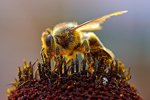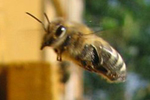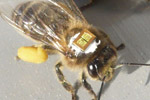
Honey bee (Apis mellifera) collecting pollen. Photo by: Jon Sullivan.
Exposure to commonly used pesticides directly disrupts brain functioning in bees, according to new research in Nature. While the study is the first to record that popular pesticides directly injure bee brain physiology, it adds to a slew of recent studies showing that pesticides, especially neonicotinoids, are capable of devastating bee hives and may be, at least, partly responsible for on-going Colony Collapse Disorder (CCD).
Christopher Connolly with the University of Dundee in Scotland and his team exposed honeybees to two pesticides at levels encountered in the wild: neonicotinoids and miticidal pesticides. By recording brain activity after exposure, the researchers found that both pesticides directly hampered bee brain functioning, including blocking neurons from firing. The findings are especially notable for studying bees after exposure to the miticidal pesticide, which is used directly on bee hives to safeguard them from a common parasite, the Varroa destructor mite. In this case, however, the cure may be worse than the disease.
“Much discussion of the risks posed by the neonicotinoid insecticides has raised important questions of their suitability for use in our environment,” Connolly explains. “However, little consideration has been given to the miticidal pesticides introduced directly into honeybee hives to protect the bees from the Varroa mite. We find that both have negative impact on honeybee brain function.”
Furthermore the researchers found that when bees were exposed to both chemicals—the neonicotinoids and miticidal pesticides—their brain functioning and learning abilities were hurt even more.
The study is the first to show the direct brain impacts that may explain why bees exposed to these pesticides slow aberrant behavior, including losing their way easily and slow reactions. Scientists both in the U.S. and Europe have recorded the complete collapse of hives following exposure. However, pesticide companies have continually argued that their products cause no harm to bees even as high-profile independent research from multiple sources appears to be telling a very different story.
The research has spurred some policy movement. France has banned the use of neonicotinoids on certain crops. The EU proposed a ban on neonicotinoids for two years after a committee looked at the research for six months. However, the ban was scuttled by opposition from Germany and the UK, though it could still come up in appeal. Most recently, nine beekeeping and environmental groups sued the U.S. Environment Protection Agency (EPA) for failing to take action to protect bees.
Bees are key plant pollinators, and their decline has worried scientists, farmers, and policymakers worldwide. In the U.S. alone, bee pollination is estimated to be worth $8-12 billion. While bee declines have occurred in the past, researchers believe this one is much more severe.
CITATION: Mary J. Palmer,Christopher Moffat, Nastja Saranzewa, Jenni Harvey, Geraldine A. Wright, Christopher N. Connolly. Cholinergic pesticides cause mushroom body neuronal inactivation in honeybees. Nature Communications. 4, Article number: 1634. doi:10.1038/ncomms2648.
Related articles
EU pushes ban on pesticides linked to bee downfall

(02/05/2013) Following a flood of damning research on the longterm impact of neonicotinoid pesticides on bee colonies, the EU is proposing a two year ban on the popular pesticides for crops that attract bees, such as corn, sunflower, oil seed rape, cotton. The proposal comes shortly after European Food Safety Authority (EFSA) released a report that found neonicotinoid pesticides posed a “number of risks” to bees.
New study adds to evidence that common pesticides decimating bee colonies

(10/24/2012) The evidence that common pesticides may be partly to blame for a decline in bees keeps piling up. Several recent studies have shown that pesticides known as “neonicotinoid” may cause various long-term impacts on bee colonies, including fewer queens, foraging bees losing their way, and in some cases total hive collapse. The studies have been so convincing that recently France banned the use of neonicotinoid pesticides. Now a new study finds further evidence of harm caused by pesticides, including that bees who are exposed to more than one chemical, i.e. neonicotinoid and pyrethroid, were the most vulnerable.
After damning research, France proposes banning pesticide linked to bee collapse
(06/04/2012) Following research linking neonicotinoid pesticides to the decline in bee populations, France has announced it plans to ban Cruiser OSR, an insecticide produced by Sygenta. Recent studies, including one in France, have shown that neonicotinoid pesticides likely hurt bees’ ability to navigate, potentially devastating hives. France has said it will give Sygenta two weeks to prove the pesticide is not linked to the bee decline, known as Colony Collapse Disorder (CCD).
Researchers recreate bee collapse with pesticide-laced corn syrup

(04/05/2012) Scientists with the Harvard School of Public Health (HSPH) have re-created the mysterious Colony Collapse Disorder in several honeybee hives simply by giving them small doses of a popular pesticide, imidacloprid. Bee populations have been dying mysteriously throughout North America and Europe since 2006, but the cause behind the decline, known as Colony Collapse Disorder, has eluded scientists. However, coming on the heels of two studies published last week in Science that linked bee declines to neonicotinoid pesticides, of which imidacloprid is one, the new study adds more evidence that the major player behind Colony Collapse Disorder is not disease, or mites, but pesticides that began to be widely used in the 1990s.
Smoking gun for bee collapse? popular pesticides

(03/29/2012) Commonly used pesticides may be a primary driver of the collapsing bee populations, finds two new studies in Science. The studies, one focused on honeybees and the other on bumblebees, found that even small doses of these pesticides, which target insect’s central nervous system, impact bee behavior and, ultimately, their survival. The studies may have far-reaching repercussions for the regulation of agricultural chemicals, known as neonicotinoid insecticides, that have been in use since the 1990s.